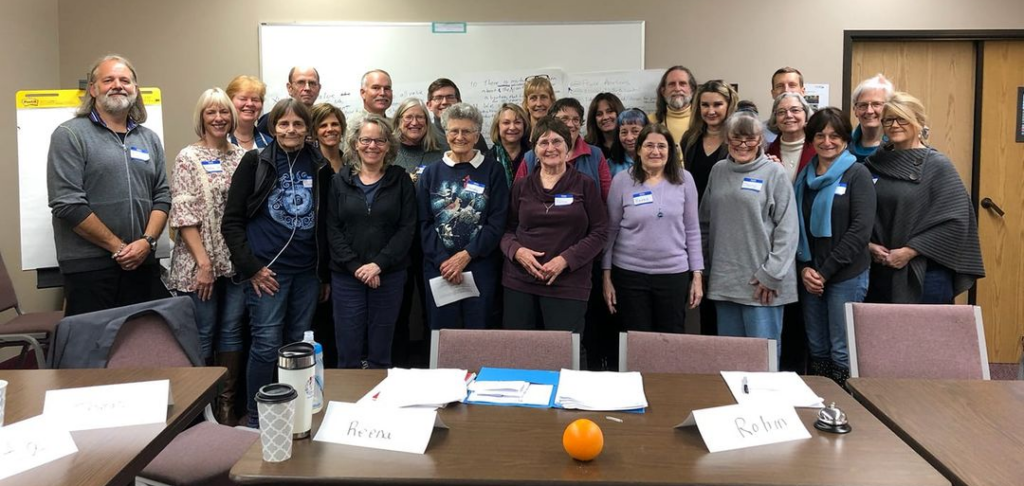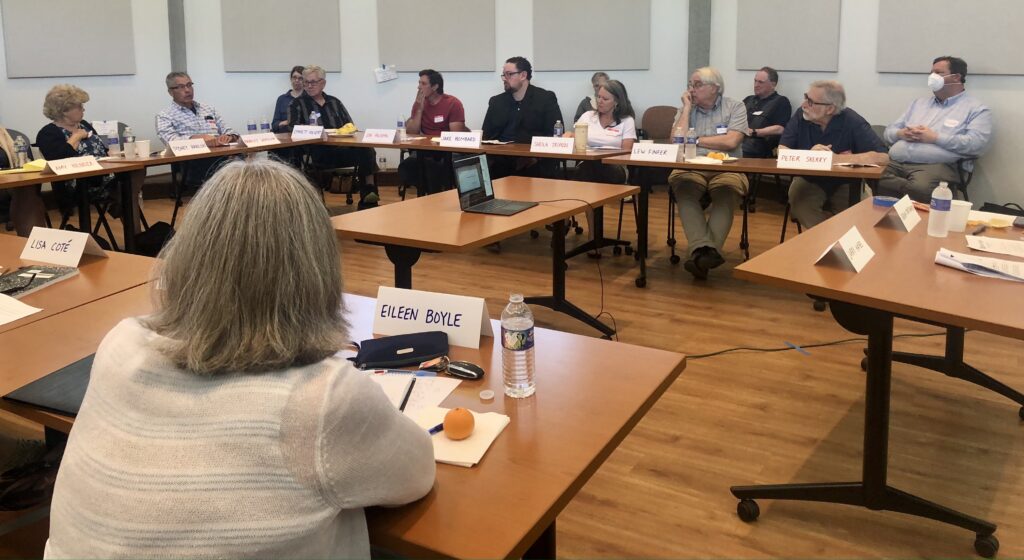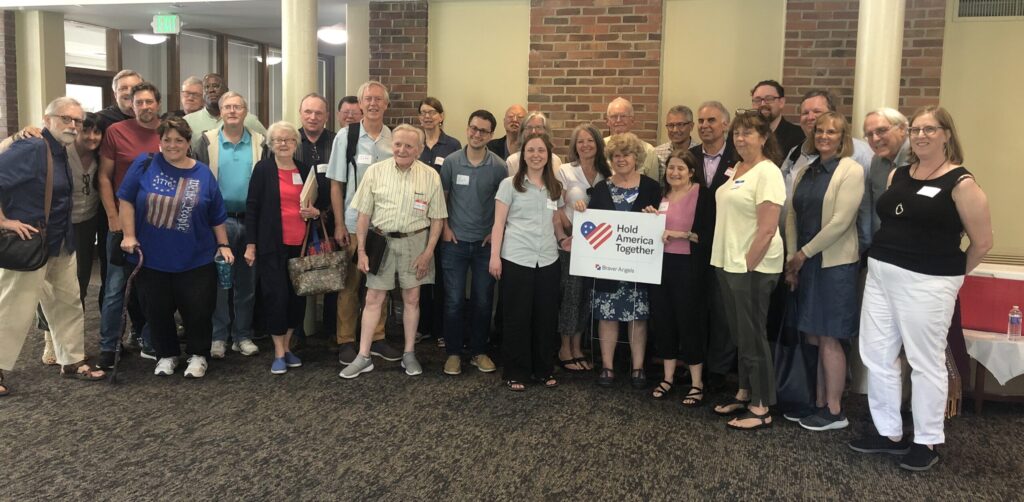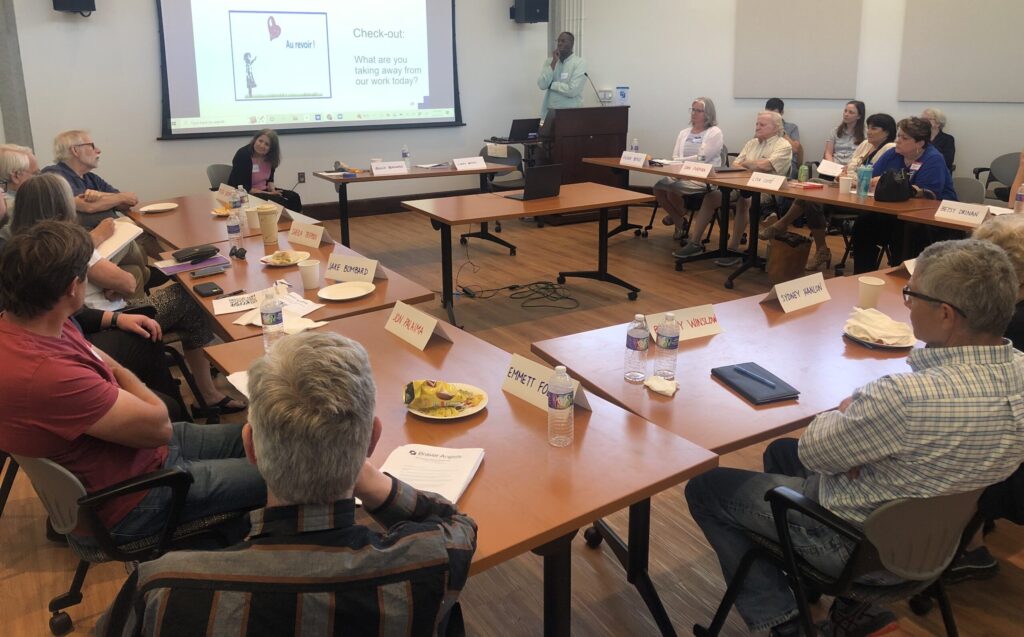Just a day after one of the most controversial and consequential Supreme Court decisions – Roe v. Wade – was overturned, eight Reds and eight Blues from across Massachusetts and New Hampshire gathered together in a Boston College classroom to see if they could find common ground on another hot-button issue: how to ensure trustworthy elections.
Over the course of four hours, they engaged in four different activities. First, there was a “fishbowl exercise,” during which Reds and Blues took turns gathering in the center of a circle to share their personal experiences and what was at the heart of the issue for them. People spoke about mail-in ballots, voting machines, and the role of the media. Then, they broke off into Red/Blue pairs to talk about solutions they would be open to, which allowed them to explore the confines of agreement. Next, Reds went into one room and Blues went into another, where they separately worked to find values, concerns, and solutions to which both sides could agree. Before coming back together, there had to be unanimous agreement within the Reds and within the Blues about their side’s proposals.
Finally, they came back and shared their ideas with each other and went through an elimination process, during which any Red participant and any Blue participant could cross out a proposal on the opposite side if they didn’t agree – no explanation needed. At the end, they returned to what’s been crossed out – such as requirements about voter ID – to see if they could debate and forge an agreement. If not, it wasn’t included in the final common points of agreement.
The Common Ground Single Issue Workshop was developed in 2019 as an outgrowth of Braver Angels’ signature Red/Blue Workshop, which is designed for Reds and Blues to better understand one another. “Instead of just getting to know each other – which can be step one – people want to go further and focus on a single issue,” John Schwenkler, head of Braver Angels’ workshop development team, said. Having a narrow focus allows Red and Blue participants to dive deep into an issue, but it’s the structure – developed by Reena Bernards, a Braver Angels leader – that keeps everyone on task and able to have a productive dialogue.
Reena, who has been moderating Braver Angels workshops since 2017, developed the Common Ground Workshop after a group in Grants Pass, Oregon asked her to do one strictly on abortion. “The reaction from participants is similar to other workshops: ‘We aren’t as different as we thought,’” Reena said. “I wanted to bottle that hope and turn it into something actionable.” Today, Common Ground Workshops are happening across the country – and they’re igniting a spark within these communities. “There’s a group in El Sobrante, California that did one on homelessness,” Reena said. “They went from a Common Ground Workshop to a town hall where they invited local politicians and shared their solutions.”
“By the end of the workshop, I was backing up positions of the opposite side. I absolutely did not see that coming when I came in.”

Back in the Boston College classroom, Jacob Bombard, a Blue participant, said he was gearing up for Battle Royale. “I had all my talking points ready,” he said. “Especially since it was the day after the Roe V. Wade decision – I have a daughter – I was skeptical of my own ability to be civil.” And then, something changed. “By the end of the workshop, I was backing up positions of the opposite side,” he said. “I absolutely did not see that coming when I came in.”
So what happened? “Whenever anyone has a political argument, the scope of that argument gets broad very quickly. It becomes about ideology rather than the mechanics of a specific issue,” he said. “If you keep the scope of the argument narrow, that provides a pathway for you to come up with solutions. And when the other side is asking for a compromise, ask yourself in all earnestness if we can accomplish this in a way that doesn’t conflict with my beliefs, and if there is, then you’ve found a way to compromise.”
“When you are in a room with a person, you see them, you’re listening to their beliefs. It’s much easier to understand where they’re coming from than 140 characters on Twitter.”

State Representative Lenny Mirra, a Red participant, is well-versed in debating specific political issues, but he’s not used to how productive the process can be. “Just think about how legislators have such a hard time coming up with voting reforms and we did it in a matter of hours – and this was with people from both sides of the aisle,” he said. “This methodology shows we have a lot of common ground and agree on a lot of things but legislatures don’t work that way so getting this done [in government] is hard to do.”
The agreed-upon solutions included proposals such as a transparent auditing process and each state providing polling places based on population to prevent long wait times. As for concerns, there was one clear commonality from the beginning. “Both sides immediately jumped on the idea that the media is doing such a horrible job at dividing us – especially social media,” Lenny said. “You’re a lot bolder sitting on your living room couch. You’re less likely to spout off or to be insulting face to face.”
Jacob agreed – pointing out that this workshop is the antidote to social media. “When you are in a room with a person, you see them, you’re listening to their beliefs,” he said. “It’s much easier to understand where they’re coming from than 140 characters on Twitter. I worry if my kids don’t have these in-person social interactions then our interactions online will become the norm for how we speak to one another.”
“It was an emotional moment for me. I felt like she saw me as a person.”

Breaking off into Red/Blue pairs drove this point home for him. While he and his Red counterpart are two different people, with two opposing beliefs, they were able to forge a meaningful connection. “It was an emotional moment for me,” he said. “I felt like she saw me as a person.” Had they only interacted on social media, this likely wouldn’t have been the case. “I might’ve expected we would hate each other,” he said. But instead, “it was just a very humanizing experience.”
As for Reena, she has high hopes for what these workshops could do for our country. “I have visions of people being able to take the agreements and go do speaking engagements with Red and Blue speakers at churches and community groups – lobbying politicians to say, ‘This is what you need to work on,’” she said. “I have visions of people taking these Common Ground Workshops and turning them into actions – that’s the future of it in my mind.”
To sign up for or learn more about the Common Ground Single Issue Workshops, go to this link. To suggest more stories I could report from the Braver Angels community, send me a note at gtimmis@braverangels.org.




